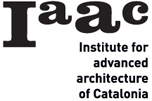 This excersise is a brief exploration on the digital fabrication process: from Rhinoscript to laser cut.
This excersise is a brief exploration on the digital fabrication process: from Rhinoscript to laser cut.
TEAM: Nicholas Waissbluth, Michael Harrison, Ali Gharakhani, Moises Gamus. TUTOR: Luis Fraguada
Mainly the idea is to fabricate a surface for a given purpose and at a buildable scale (according to the means available), using scripting techiniques as translation tool: from digital to real.


SURFACE TRIANGULATION: The script will generate a subdivision based on flat triangles, which will emulate the curvature of the surface, yet will remain as flat pieces to allow being cut by a laser cut machine. The resolution of the surface will depend on the number of subdivisions on U and V, which are inputs for the script.


Once having the surface subdivided, the next step is to nest the pieces on a flat plane. Since time is always a factor, we wanted to reduce the number of pieces being cut/glued, so the nesting is made in strips of triangles which keep the original geometry of the surface (by engraving all the triangles of the strip) and allow for some time savings!

Once cut, the pieces are glued together. At this point, it is important to consider the material options of the model, for issues such as flexibility, rigidity, durability, price…

This prototype shows both the possibility of the process of digital fabrication, as well as the apparent errors on precision for real scale models. In this case, the material selected was a plastic sheet, which offers certain resistance to the imposed geometry, so maybe the resolution of the subdivision should be increased. In this way, prototyping becomes an excersis of trial and error, and such process is optimized through the use of the written script.

The final result is not the prototype itself, but the understanding of a sequence that allows for a digital fabrication process.
Other examples of surface subdivisions for further research (based on the scripts realized in the seminar with Luis Fraguada):


